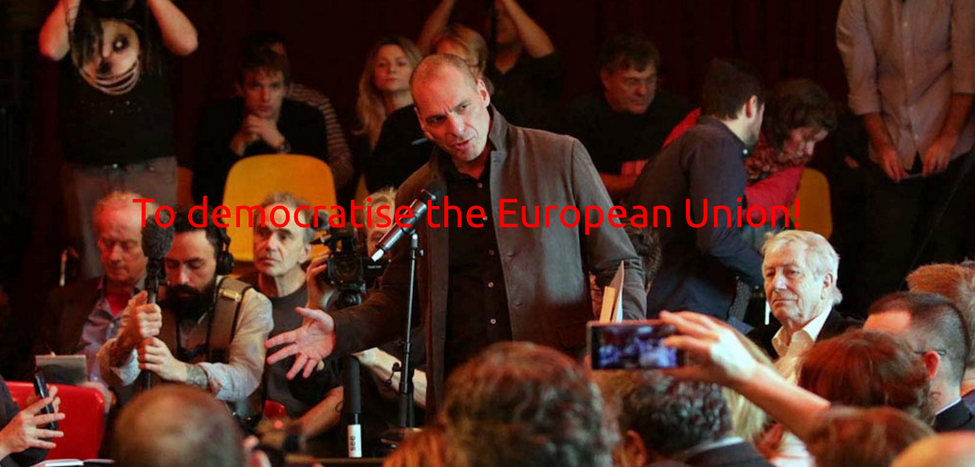
DiEM25 – How Varoufakis wants to save Europe
Published on
Yanis Varoufakis, the iconoclastic former Finance Minister of Greece and now infamous celebrity, has found a new project to work on.
Since leaving the Greek government at the end of last year, Varoufakis worked on a book called “And the weak suffer what they must” on the origins of the Eurocrisis, which was released in April.
He also created a new movement – Democracy in Europe Movement 2025, in short DiEM25. This pan-European, non-partisan initiative aims at – have a wild guess - democratising Europe and the European institutions in particular. Since it’s launch in Rome on March 23, 2016, American philosopher Noam Chomsky, English filmmaker Ken Loach, and famous whistleblower and Wikileaks founder Julian Assange joined DiEM25.
As Finance Minister of Greece, Varoufakis rose to fame with his fierce battle against the “Troika”, daring to define himself as an “erratic Marxist” in circles in which the word alone makes people turn away. He also dared to defend core socialist values and to interpret the economic order we live in through an alternative prism.
And this is the reason why we should be interested in Varoufakis’ intentions with DiEM25: The initiaitve wants to tackle the democratic deficit of European institutions, the faulty architecture of the monetary union, and a lack of alternatives to a capitalistic socioeconomic model which has proven to be not only failing, but also dangerous for its own population. Varoufakis has recognised the clear relation between the Eurozone bailouts and the rise of populist right-wing parties such as Golden Dawn and has decided to do something about it.
But what exactly is Diem25?
In short, DiEM25 wants to develop viable alternatives and respond to the existentialist crisis Europe has entered since the 2008 financial crisis (hence the title of Varoufakis’s blog: “Thoughts for our post-2008 world”)
According to its very own Manifesto, the goals of DiEM25 are to fight together against a European establishment deeply contemptuous of democracy; to end the reduction of all political relations into relations of power masquerading as merely technical decisions; to subject the EU’s bureaucracy to the will of sovereign European peoples; to dismantle the habitual domination of corporate power over the will of citizens; and finally to re-politicise the rules that govern our single market and common currency.
DiEM25 defines itself as non-partisan, and thus inclusive of all people accepting the Manifesto. However, it is easy to claim not to be affiliated to any political parties. At the same time, the movement will need some kind of definition of “democracy” – what exactly will DiEM25 be fighting for? Is it solely a movement to promote Varoufakis’s points of views? Will it become a truly “popular” movement” defined by its members and supporters? And what is the aim of the initiative? To become a political party and entering institutions to promote change there?
First pitfalls of the initiative
These points of criticism towards DiEM25 were already made by two academics in an open letter, to which Varoufakis responded quickly. Both academics also pointed out the questions DiEM25 has yet to answer:
The identity of Diem 25 remains vague and uncertain: Is it something that is constituted by individuals, pre-constituted groups, or is it just a narrative related by Yanis Varoufakis Who is the enemy they are fighting against? Is the enemy the structures of the European Union? Or possibly the economic elites? Or just the Brussels’ bureaucrats? Has Varoufakis neglected the national and regional levels of decision-making by putting all its bets on the European dimension? How will Diem25 democratise its own internal structures?
A welcomed platform for discussions on the Left
Many of those questions will surely be answered once DiEM25 grows and the debate within the movement evolves. However, it remains to be seen whether DiEM25 will be able to democratise its own structures and achieve to find a consensus about the notion of “democracy” they want to promote – in short, how exactly they want to democratise Europe.
Nevertheless, DiEM25 is a welcomed platform of discussions which will hopefully trigger debates among the Left in Europe in times where “pragmatism, transparency and good governance” have increasingly overshadowed real “politics”. Today, what we need in Europe is more debates and visions – and as the Belgian political scientist Chantal Mouffe said: “We need a Left populism” to counteract the rising extreme right. DiEM25 is an attempt to achieve exactly this.



